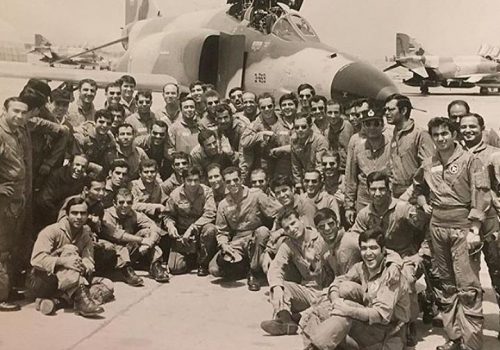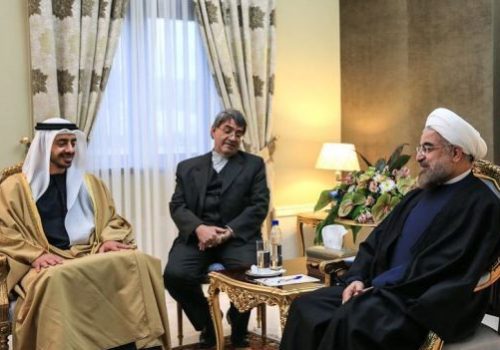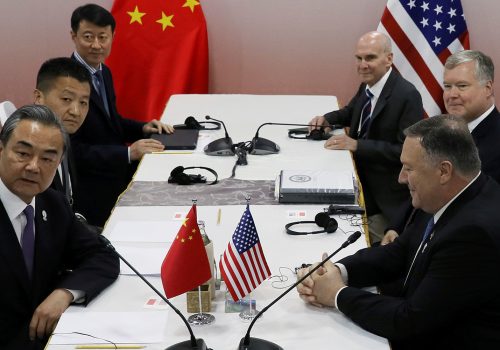Hossein Dehghan and other military vets vie for Iran’s presidency
Iranian politics today are reminiscent of the early 2000s, when hardliner Mahmoud Ahmadinejad replaced reformist President Mohammad Khatami in 2005 with the support of the Islamic Revolutionary Guard Corps (IRGC).
The terrorist attacks of September 11, 2001 and the United States’ response to them—invading Afghanistan and then Iraq and putting Iran on a rhetorical “Axis of Evil”—sealed the failure of Khatami’s efforts to reduce tensions with Washington and further paved the way for the rise of the IRGC in Iranian politics. The election of Donald Trump in 2016, his disavowal of the Iran nuclear deal, and policy of “maximum pressure”—including sanctions and threats of military confrontation—have had a similar impact. In this tense environment, the military is playing an even more active role in Iran’s foreign and domestic policies.
In the last parliamentary elections held in February, many reformist candidates were disqualified and the hardliners regained the majority they had lost to supporters of pragmatist President Rouhani in 2016, taking 221 of the 290 seats in parliament. In the process, Mohammad Baqer Qalibaf, a former IRGC commander who had run unsuccessfully in 2005 and 2013 for the presidency, became the speaker of parliament. With the judiciary also headed by a conservative, the presidency is the only office not currently occupied by this group since Ahmadinejad left office in 2013.
Given the extraordinary circumstances that Iran is currently facing, it appears that the establishment is pondering elevating a former high-level military officer to head the executive branch.
Mohammad Sadeq Javadi-Hesar a reformist politician, has recently argued in an interview that “whether the country can accept a military person [as the president] depends on the strategy of [the system].It is possible that [the] establishment concludes that to harmonize the country—including both the military and civilian—we need a military option at the top of executive branch.”
Similarly, Mohsen Rafiqdoost, the former minister of the IRGC and a former Guards commander, told Khabar Online that “maybe if a military person takes charge [in the next presidential elections] he can restrain the uncontrollable inflation and save the people.” Rafiqdoost also said that a number of IRGC commanders are preparing to announce their candidacy for the elections. He specifically mentioned Brigadier General Hossein Dehghan, a veteran of the 1980-1988 Iran-Iraq war, who is also a former IRGC air force General and former defense minister. In September 2020, Dehghan confirmed his plans to run in the June 2021 presidential elections, proclaiming that “I come with [my] strength; I believe we must save the people from the current situation.”
Dehghan, who is currently serving as defense advisor to Supreme Leader Ayatollah Ali Khamenei, has a long record in Iran’s defense establishment. Brigadier General Shimon Shapira of the Jerusalem Center for Public Affairs notes that Dehghan was sent to Lebanon in the summer of 1982, following the Israeli invasion of that country, to lead an IRGC training center that built up the powerful force later known as Hezbollah.
After the conclusion of the Iran-Iraq war in 1988, Dehghan was appointed commander of the IRGC Air Force, a post he held from 1990-1992. Under President Khatami, Dehghan served as deputy defense minister to Rear Admiral Ali Shamkhani and then head of the powerful Martyrs Foundation under Ahmadinejad. Dehghan also served as Rouhani’s first defense minister from 2013-2017.
Prior to his announcement that he will run for president, Dehghan increased his profile in Iranian domestic politics, seeking to align himself with influential conservative clergy. In September, he met with the Custodian of the Imam Reza Shrine in Mashhad, a historically influential religious center in Iran, and the Imam of Friday Prayers, Ayatollah Ahmad Alamolhoda, who has been a strong critic of Rouhani’s foreign policy in engaging with Washington. An endorsement from Alamolhoda, who previously supported Saeed Jalili, the former Iranian nuclear negotiator, could substantially improve Dehghan’s chances.
Dehghan claims that he does not belong to a particular faction, saying, “I was neither one of Ahmadinejad’s men nor…Khatami’s.” Hesameddin Ashena, an advisor to Rouhani, has observed that Dehghan is “a capable manager with charismatic strength who can engage with the Leader [Ayatollah Khamenei] and other branches, as well as the armed forces…. His problem is communicating with the people.” Attracting the ordinary people would indeed seem to be a challenge for Dehghan.
In general, presidential candidates with a military background have not been successful at gaining the trust of Iranian voters. Secretary of Iran’s National Security Council (SNSC) Ali Shamkhani, former IRGC commander Mohsen Rezaei, and Brigadier General Qalibaf have all tried and failed to attract a large number of voters. Jalili and Ali Larijani, a former speaker of parliament who also has a background in the IRGC, have also fallen short. One could argue that the root of this problem lies with Iranians’ aversion to the “government of boots,” although there is nostalgia among some for a strongman akin to Reza Shah, the founder of the Pahlavi dynasty.
The next Iranian president will face enormous difficulties, including a collapsed economy, devalued currency, and the after-effects of the COVID-19 pandemic. A military figure such as Dehghan, has the potential to unite the IRGC, conservatives, and some pragmatic forces, given his long background in the defense establishment, which could help to resolve chronic domestic factionalism. However, his popular appeal remains in doubt as do the prospects for a reduction in tensions with the United States, even if Trump loses to Joe Biden in the November US presidential elections. Whether a figure like Dehghan—or a civilian president—would be a better interlocutor with Biden is also hard to gauge.
Sina Azodi is a nonresident fellow at the Atlantic Council and a visiting scholar at the George Washington University’s Institute for Middle East Studies. He is also a PhD Candidate in International Relations at University of South Florida. Follow him on Twitter @Azodiac83.
Subscribe for more from IranSource
Sign up for the IranSource newsletter, which provides a holistic look at Iran’s internal dynamics, global and regional policies, and posture through unique analysis of current events and long-term, strategic issues related to Iran.
Image: Iranian Defence Minister Hossein Dehghan delivers a speech as he attends the 5th Moscow Conference on International Security (MCIS) in Moscow, Russia, April 27, 2016. VIA REUTERS/Sergei Karpukhin


